Premium
Intrigues behind choice of Simiyu as Kenya 7s coach
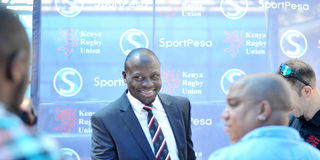
Kenya Sevens coach Innocent Simiyu gestures during a past function.
What you need to know:
- It all started when the panel of selectors that comprised Feeney, acting KRU chief executive officer Thomas Odundo and World Rugby educator Peter Hardy short-listed four coaches after interviews that were conducted via zoom.
- They were Simiyu, former Kenya Sevens coach Paul “Pau” Murunga, former Kenya international Dennis “Iron man” Mwanja and Welsh Nick Wakley.
Over the last 10 years, no Kenya Sevens coach has held the job for more than two seasons.
Not even South Africa’s Paul Treu, who had guided Springboks Sevens to World Rugby Sevens Series victory in the 2008/2009 season and 2010 Delhi Commonwealth Games bronze medal.
Will former Kenya 15s and Kenya Sevens player Innocent Simiyu exorcise those demons on his return as Kenya Sevens team head coach?
The 37-year-old former Impala Rugby Club and Kenya Harlequin player, was named the head coach Tuesday after intense lobbying and intrigues over the past three weeks.
Simiyu, who handled the team for two seasons (2016 to 2018), was unveiled by Kenya Rugby Union (KRU) chairman Oduor Gangla.
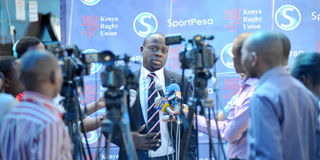
Kenya Sevens coach Innocent Simiyu addresses the media during a past event.
Simiyu, the only other coach to handle Kenya Sevens team twice in the last decade, takes over from Paul Feeney of New Zealand, who resigned in April this year.
14 applicants
Benjamin Ayimba handled Kenya Sevens in 2010 -11 and 2015-2016 seasons. The job attracted 14 applicants from Kenya and South Africa and as far as Europe and Australia, a clear indication of the attraction of Shujaa in world sevens rugby.
It all started when the panel of selectors that comprised Feeney, acting KRU chief executive officer Thomas Odundo and World Rugby educator Peter Hardy short-listed four coaches after interviews that were conducted via zoom.
They were Simiyu, former Kenya Sevens coach Paul “Pau” Murunga, former Kenya international Dennis “Iron man” Mwanja and Welsh Nick Wakley.
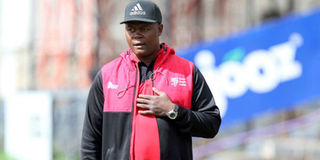
Ex-Kenya Sevens Coach Paul Murunga looks on during their training session on May 9, 2019.
A KRU executive committee meeting on August 26 whittled down the selection to three -- Simiyu, Mwanja and Murunga - as Wakley’s application was put on hold owing to the attendant financial implications.
It is reported that the Kenya Cup clubs caucus met to endorse Mwanja, who is KCB Sevens coach, as the next Kenya Sevens coach, a move that not only split the KRU board, but also put Gangla under pressure from both sides of the divide. The influential Kenya Cup clubs caucus was particularly assertive.
The board then meet on August 27 and settled on Mwanja following a vote. He was even scheduled to be officially unveiled on September 2, but that was not to be.
Political dimension
Nine board members voted for Mwanja, while three picked Simiyu and the other three abstained.
A source explained that the board had only two options - to hire Mwanja or Simiyu.
Many thought Simiyu would reclaim his former position as he was the clear favourite among the three tacticians.
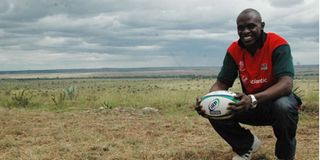
Former international Dennis "Ironman" Mwanja.
But the Kenya Cup clubs caucus’ recommendations seemed to have taken precedence in the selection over the qualification that KRU had put in place when they advertised for the job.
The selection had now taken a political dimension, with Thika Road-based clubs wanting their man coaching a national team.
Kenya national XVs side Kenya Simbas is coached by Paul Odera, an ex-Quins player who is perceived to have an inclination towards Ngong Road-based clubs.
Those opposed to Mwanja’s selection said it was wrong for the union to try to sanitise the process by inviting foreign applications when they knew very well they would settle for a local coach.
They questioned Mwanja’s credentials since among the requirements for the job, the union wanted a person who had handled a team at high performance level for the last three seasons and had a World Rugby Level II coaching certification.
Mwanja is currently pursuing Level II certification, while Simiyu and Murunga met all the qualifications.
The famous 2018 Paris Sevens players’ protest initially worked against Simiyu’s, with some of the directors blaming him for not taking control of the situation.
They argued that the protest had made potential sponsors shy away from engaging with the team.
The information on the appointment of Mwanja leaked out to both the mainstream and social media.
This forced the KRU Board to meet on Tuesday last week where it overturned the decision to appoint Mwanja and instead settled for Simiyu, who was to be unveiled on Friday.
Even after settling for Simiyu, another challenge came when the former Impala Rugby Club and Kenya Harlequin centre, picked on Will Webster as his deputy.
Webster is currently with the Hong Kong Sevens, and the union could not meet the costs of employing him.
As the Kenyan rugby fraternity speculated on who would be selected, the union finally unveiled Simiyu. His supporting bench will be named later, Gangla said during the press function.
“I will support Namcos fully since a final decision has been made,” said Mwanja, adding that it’s all about the game and not an individual. “We shall continue serving the game.”
Still, the 2018 Paris saga came to hunt Simiyu at his unveiling that was done via zoom on KRU TV.
He again had to apologise to the nation, saying that the protest by players should have not happened.
Simiyu said the protest left a big scar on the nation, saying it was not the best stage for players to air their grievances regardless of the situation.
Players protested over reward payment by concealing the logo of the team’s shirts sponsor, Brand Kenya.
Simiyu opted to take responsibility for what happened rather than report certain players for reprimand.
KRU relieved Simiyu of his duties and advertised the job, and Simiyu did no reapply, with the Paris Sevens saga hanging over his head.
The protest saw the Ministry of Tourism end its sponsorship of the team through Magical Kenya and Kenya Tourism Board.
“It wasn’t the best way to air grievances and I took responsibility as the head of the team,” said Simiyu.
He said all sports organisations need to have proper communication systems.
“We need to ensure that there are proper codes of instructions that are adhered to.
“We really don’t need to use such a high stage to communicate our problems,” said Simiyu.
Gangla said the board unanimously recommended Simiyu for the job.
The KRU boss said they had to look back at what happened at the 2018 Paris Sevens and how the situation was managed.
“The 2018 Paris Sevens remains topical in many people’s minds. We have looked back at the whole incident and how it was managed,” Gangla said.
“There have been a lot of lessons taken on board on both sides to ensure that we are able to manage such challenges better in future if need arises.”
Gangla said the union was quite comfortable and confident in handing over the responsibility of Kenya Sevens team to Simiyu.
“We are certain that he will do the jersey and country proud.
“That is why it’s important to get the right leadership that can take the team forward and enable it achieve its full potential. The appointing process had to be followed through to the end with the final decision being the best and of the highest interest of the game.”
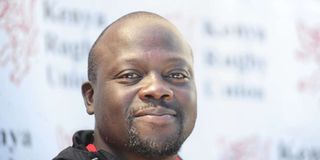
Kenya Sevens coach Innocent Simiyu.
Simiyu, who officially starts the job on October 1, has a two-year contract that will see him handle the team at the Tokyo Olympic Games next year and the 2022 World Cup qualifiers. The World Cup will be held in Cape Town.
Simiyu, an elusive running winger in his playing days, said he wanted to maintain Kenya as a powerhouse in the world of sevens rugby.
“I will have to come up with the best team and the players who will meet the standards no matter the age,” said Simiyu.
“Whoever meets the requirements and executes my plan well has a better chance of selection.
“I will always advocate for the Kenyan style of play and philosophy that looks at a wholesome player, who is agile in defence and attack,” said Simiyu.





